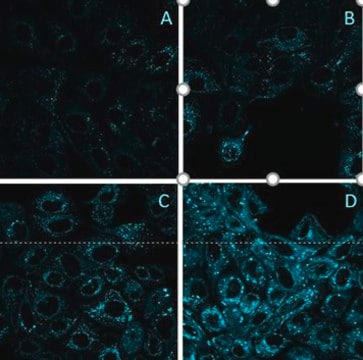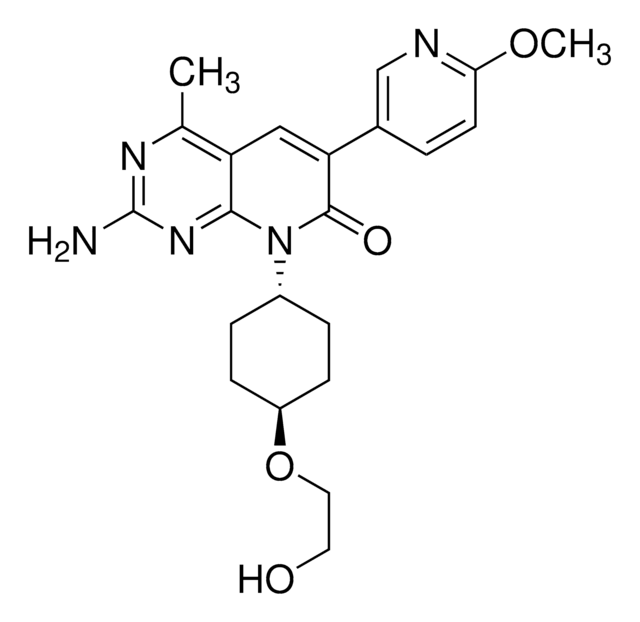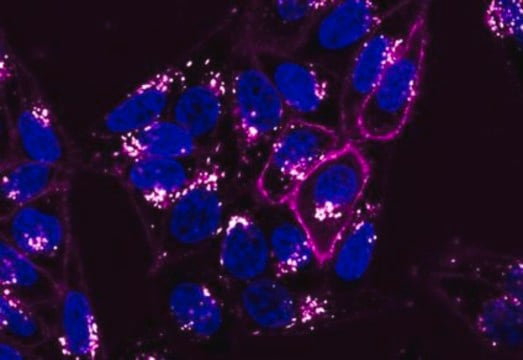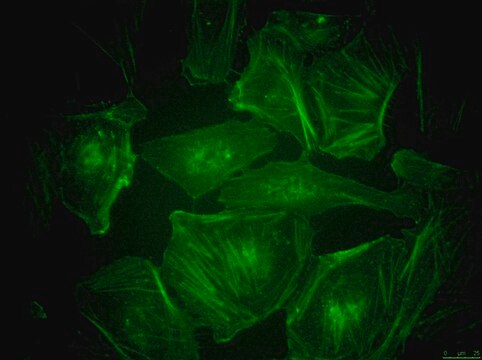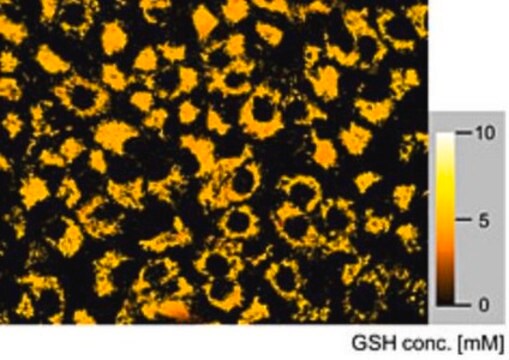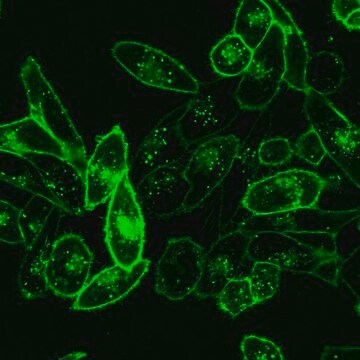SCT080
BioTracker Rd1 Hypochlorite Live Cell Dye Antibody, Green
Se connecterpour consulter vos tarifs contractuels et ceux de votre entreprise/organisme
About This Item
Code UNSPSC :
12352207
Nomenclature NACRES :
NA.47
Produits recommandés
Essai
≥98% (HPLC)
Forme
lyophilized
Poids mol.
calculated mol wt 1080.94
Conditionnement
pkg of 1 mg
Fabricant/nom de marque
Millipore
Conditions de stockage
desiccated
protect from light
Technique(s)
cell based assay: suitable
Couleur
off-white
Méthode de détection
fluorometric
Conditions d'expédition
ambient
Température de stockage
−20°C
Description générale
Hypochlorite (HClO/ClO-) is a reactive oxygen species (ROS) produced by the enzyme myeloperoxidase (MPO), which catalyzes the reaction of hydrogen peroxide (H2O2) and chloride ion (Cl-), and plays an important role in the immune response to defend against invading pathogens. Excessive generation of hypochlorite could lead to oxidative stress, which causes inflammation and can lead to a range of diseases, including cardiovascular diseases, atherosclerosis, osteoarthritis, neuron degeneration and cancers.
BioTracker Rd1 Hypochlorite Live Cell Dye is a mitochondria-immobilized turn-on green fluorescent probe for the selective detection of hypochlorite (ClO-). The probe contains a benzoyl acetohydrazide linking site for ClO- recognition, a triphenylphosphonium group for mitochondria targeting, and a reactive methoxymaleimide subunit for mitochondrial fixation. The targeting and fixed properties of the probe enable it to accumulate in mitochondria and prevents leakage of the dye upon the decrease of mitochondrial membrane potential (MMP). This probe may be used to visualize exogenous and endogenous ClO- levels in living cells, tissues, and zebrafish.
Reference:
1. Li, M. Y., et. al. (2020). Mitochondria-Immobilized Fluorescent Probe for the Detection of Hypochlorite in Living Cells, Tissues, and Zebrafishes. Analytical chemistry, 92(4), 3262-3269.
BioTracker Rd1 Hypochlorite Live Cell Dye is a mitochondria-immobilized turn-on green fluorescent probe for the selective detection of hypochlorite (ClO-). The probe contains a benzoyl acetohydrazide linking site for ClO- recognition, a triphenylphosphonium group for mitochondria targeting, and a reactive methoxymaleimide subunit for mitochondrial fixation. The targeting and fixed properties of the probe enable it to accumulate in mitochondria and prevents leakage of the dye upon the decrease of mitochondrial membrane potential (MMP). This probe may be used to visualize exogenous and endogenous ClO- levels in living cells, tissues, and zebrafish.
Reference:
1. Li, M. Y., et. al. (2020). Mitochondria-Immobilized Fluorescent Probe for the Detection of Hypochlorite in Living Cells, Tissues, and Zebrafishes. Analytical chemistry, 92(4), 3262-3269.
Application
Purity ≥ 98% confirmed by HPLC. Identification confirmed by HNMR, LC-MS, and elemental analysis.
Caractéristiques et avantages
Mitochondria-immobilized turn-on green fluorescent probe for the selective detection of hypochlorite.
Forme physique
Lyophilized. Off-white solid.
Stockage et stabilité
Store at -20°C, desiccate and protect from light
Note: Centrifuge vial briefly to collect contents at bottom of vial before opening
Note: Centrifuge vial briefly to collect contents at bottom of vial before opening
Autres remarques
Live cell fluorescent imaging
Clause de non-responsabilité
Unless otherwise stated in our catalog or other company documentation accompanying the product(s), our products are intended for research use only and are not to be used for any other purpose, which includes but is not limited to, unauthorized commercial uses, in vitro diagnostic uses, ex vivo or in vivo therapeutic uses or any type of consumption or application to humans or animals.
Code de la classe de stockage
11 - Combustible Solids
Classe de danger pour l'eau (WGK)
WGK 3
Point d'éclair (°F)
Not applicable
Point d'éclair (°C)
Not applicable
Certificats d'analyse (COA)
Recherchez un Certificats d'analyse (COA) en saisissant le numéro de lot du produit. Les numéros de lot figurent sur l'étiquette du produit après les mots "Lot" ou "Batch".
Déjà en possession de ce produit ?
Retrouvez la documentation relative aux produits que vous avez récemment achetés dans la Bibliothèque de documents.
Meng-Yang Li et al.
Analytical chemistry, 92(4), 3262-3269 (2020-01-21)
A mitochondria targeting and immobilized fluorescent probe (Rd1) using triphenylphosphonium as the targeting group and methoxymaleimide as the fixed site is designed for the detection of ClO-. The methoxymaleimide fixed group can react with nucleophiles, such as the reactive thiol
Notre équipe de scientifiques dispose d'une expérience dans tous les secteurs de la recherche, notamment en sciences de la vie, science des matériaux, synthèse chimique, chromatographie, analyse et dans de nombreux autres domaines..
Contacter notre Service technique